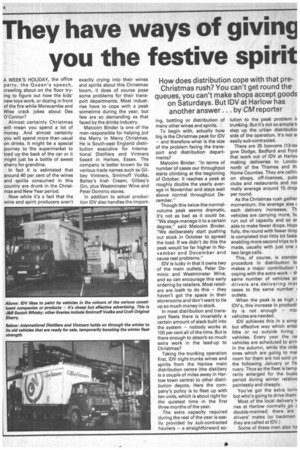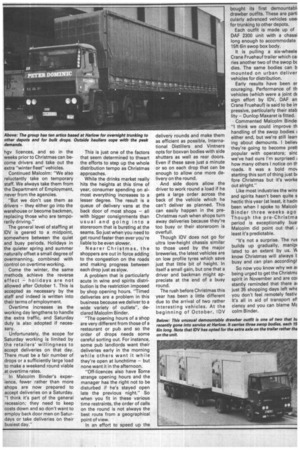They have ways of giving you the festive spirit
Page 26

Page 27

If you've noticed an error in this article please click here to report it so we can fix it.
How does distribution cope with that preChristmas rush? You can't get round the queues, you can't make shops accept goods on Saturdays. But IDV at Harlow has another answer. . by CM reporter
A WEEK'S HOLIDAY, the office party, the Queen's speech, crawling about on the floor trying to figure out how the kids' new toys work, or dozing in front of the fire while Morecambe and Wise crack jokes about Des O'Connor?
Almost certainly Christmas will mean you spend a lot of money. And almost certainly you will spend more than usual on drinks. It might be a special journey to the supermarket to load up the back of the car or it might just be a bottle of sweet sherry for grandma.
In fact it is estimated that around 40 per cent of the wines and spirits consumed in this country are drunk in the Christmas and New Year period.
Now while it's a fact that the wine and spirit producers aren't exactly crying into their wines and spirits about this Christmas boom, it does of course pose some problems for their transport departments. Most industries have to cope with a peak sometime during the year, but few are so demanding as that faced by the drinks industry.
Malcolm Binder is one of the men responsible for helping put the Merry in Merry Christmas. He is South-east England distribution executive for International Distillers and Vintners based in Harlow, Essex. The company is better known by its various trade names such as Gilbey Vintners, Smirnoff Vodka, Bailey's Irish Cream, Gilbey's Gin, plus Westminster Wine and Peter Dominic stores.
In addition to actual production IDV also handles the import
ing, bottling or distribution of many other wines and spirits.
To begin with, actually how big is the Christmas peak for IDV — and therefore what is the size of the problem facing the transport and distribution departments?
Malcolm Binder: "In terms of number of cases our throughput starts climbing at the beginning of October. It reaches a peak at roughly double the yearly average in November and stays well above normal throughout December."
Though this twice-the-normalvolume peak seems dramatic, it's not as bad as it could be. "We stage-manage it to a certain degree," said Malcolm Binder. "We deliberately start pushing out stock in October to spread the load. If we didn't do this the peak would be far higher in November and December and cause real problems."
IDV is lucky in that it owns two of the main outlets, Peter Dominic and Westminster Wine, and so can encourage this early ordering by retailers. Most retailers are loath to do this — they haven't got the space in their storerooms and'don't want to tie up so much money in stock.
In most distribution and transport fleets there is invariably a certain amount of slack built into the system — nobody works at 100 per cent all of the time. But is there enough to absorb so much extra work in the lead-up to Christmas?
Taking the trunking operation first, IDV night-trunks wines and spirits from the Harlow main distribution centre (the distillery is a couple of miles away in Harlow town centre) to other distribution depots. Here the company's policy is to fleet up with ten units, which is about right for the quietest time in the first three months of the year.
The extra capacity required 'during the rest of the year is easily provided by sub-contracted hauliers — a straightforward so
lution to the peak problem it trunking. But it's not so simple t( step up the urban distributiot side of the operation. It's not st easily sub-contracted.
There are 35 boxvans (13-toi gvw Dodge, Bedford and Ford that work out of IDV at Harlov making deliveries to Londol north of the Thames and th Home Counties. They are callin, on shops, off-licences, pubt clubs and restaurants and not mally average around 15 drop per round.
As the Christmas rush gather momentum, the average size c each delivery increases. Th vehicles are carrying more, bt. run out of capacity and so ar able to make fewer drops. How fully, the round with fewer drop is completed that little bit faste enabling more second trips to b made, usually with just one c two large calls.
This, of course, is standar procedure in distribution lot makes a major contribution I coping with the extra work — same number of vehicles an drivers are delivering mor cases to the same number outlets.
When the peak is as high r IDV's, this increase in producti ity is not enough — vehicles are needed.
IDV achieves this in a simp but effective way which entai little or no outside hiring vehicles. Every year the ne vehicles are scheduled to arrn in the autumn, while the olde ones which are going to ma] room for them are not sold un the following January or Fe ruary. Thus so the fleet is temp rarily enlarged for the busie period during winter relative painlessly and cheaply.
You've got the extra lorrio but who's going to drive them Most of the local delivery h ries at Harlow normally go double-manned; there are drivers' mates (or backmen they are called at IDV.) Some of these men also he hgv licences, and so in the weeks prior to Christmas can become drivers and take out the extra "winter fleet" vehicles.
Continued Malcolm: "We also reluctantly take on temporary staff. We always take them from the Department of Employment, never from the agencies.
"But we don't use them as drivers — they either go into the warehouse or become backmen, replacing those who are temporarily driving."
The general level of staffing at IDV is geared to a midpoint, somewhere between the quiet and busy periods. Holidays in the quieter spring and summer naturally offset a small degree of overmanning, combined with control on overtime working.
Come the winter, the same methods achieve the reverse effect — holidays are not allowed after October 1. This is accepted as necessary by the staff and indeed is written into their terms of employment.
Overtime increases as the working day lengthens to handle the extra traffic, and Saturday duty is also adopted if necessary.
Unfortunately, the scope for Saturday working is limited by the retailers' willingness to accept deliveries on that day. There must be a fair number of drops or a sufficiently large load to make a weekend round viable at overtime rates.
In Malcolm Binder's experience, fewer rather than more shops are now prepared to accept deliveries on a Saturday. "I think it's part of the general recession; they need to keep costs down and so don't want to employ back door men on Saturdays or take deliveries on their busiest day." This is just one of the factors that seem determined to thwart the efforts to step up the whole distribution tempo as Christmas approaches.
While the drinks market really hits the heights at this time of year, consumer spending on almost everything increases to a lesser degree. The result is a queue of delivery vans at the back door of most shops — all with bigger consignments than usual and going into a storeroom that is bursting at the seams. So just when you need to get round faster then ever you're liable to be even slower.
Nearer Christmas, the shoppers are out in force adding to the congestion on the roads and making progress between each drop just as slow.
A problem that is particularly acute in wine and spirits distribution is the restriction imposed by shop opening hours. "Timed deliveries are a problem in this business because we deliver to a wide variety of outlets", declared Malcolm Binder.
"The opening hours of a shop are very different from those of a restaurant or pub and so the order of drops needs some careful sorting out. For instance, some pub landlords want their deliveries early in the morning while others want it while they're open at lunchtime — but none want it in the afternoon.
"Off-licences also have Fbme strange opening hours and the manager has the right not to be disturbed if he's stayed open late the previous night." So when you fit in these various time restraints, the order of calls on the round is not always the best route from a geographical point of view.
In an effort to speed up the delivery rounds and make them as efficient as possible, International Distillers and Vintners opts for boxvan bodies with side shutters as well as rear doors. Even if these save just a minute or so on each drop that can be enough to allow one more delivery on the round.
And side doors allow the driver to work round a load if he gets a large order across the back of the vehicle which he can't deliver as planned. This can easily happen in the preChristmas rush when shops turn away deliveries because they're too busy or their storeroom is overfull.
Though IDV does not go for ultra low-height chassis similar to those used by the major breweries, the latest vehicles are on low profile tyres which save just that little bit of height. In itself a small gain, but one that a driver and backman might appreciate at the end of a busy round.
The rush before Christmas this year has been a little different due to the arrival of two rather interesting vehicles. At the beginning of October, IDV bought its first demountabli drawbar outfits. These are parti cularly advanced vehicles use' for trunking to other depots.
Each outfit is made up of DAF 2300 unit with a chassi long enough to accommodate 15ft 6in swop box body.
It is pulling a six-wheele Crane Fruehauf trailer which cal ries another two of the swop bc dies. The same bodies can b mounted on urban deliver vehicles for distribution.
Early results have been er couraging. Performance of th vehicles (which were a joint d( sign effort by (DV, DAF an Crane Fruehauf) is said to be in pressive, particularly their stab lity — Dunlop Maxaret is fitted.
Commented Malcolm Bindel "I think we could improve th handling of the swop bodies either end, but we're still leanr ing about demounts. I believ they're going to become prat' popular with operators; sinc we've had ours I'm surprised i how many others I notice on th roads. It was a bold mov starting this sort of thing just b( fore Christmas but it's worke out alright."
Like most industries the winE and spirits hasn't been quite s hectic this year (at least, it hadn been when I spoke to Malcolr Binder three weeks ago Though the pre-Christma period is exceptionally bus' Malcolm did point out that least it's predictable.
"It's not a surprise. The rue builds up gradually, manipt lated to an extent by us. W know Christmas will always t busy and can plan accordingl.
So now you know why we at being urged to get the ChristmE. spirit in November and are col stantly reminded that there al just 35 shopping days left whE you don't feel remotely festiv It's all in aid of transport et+ ciency and you can blame ME colm Binder.












































































